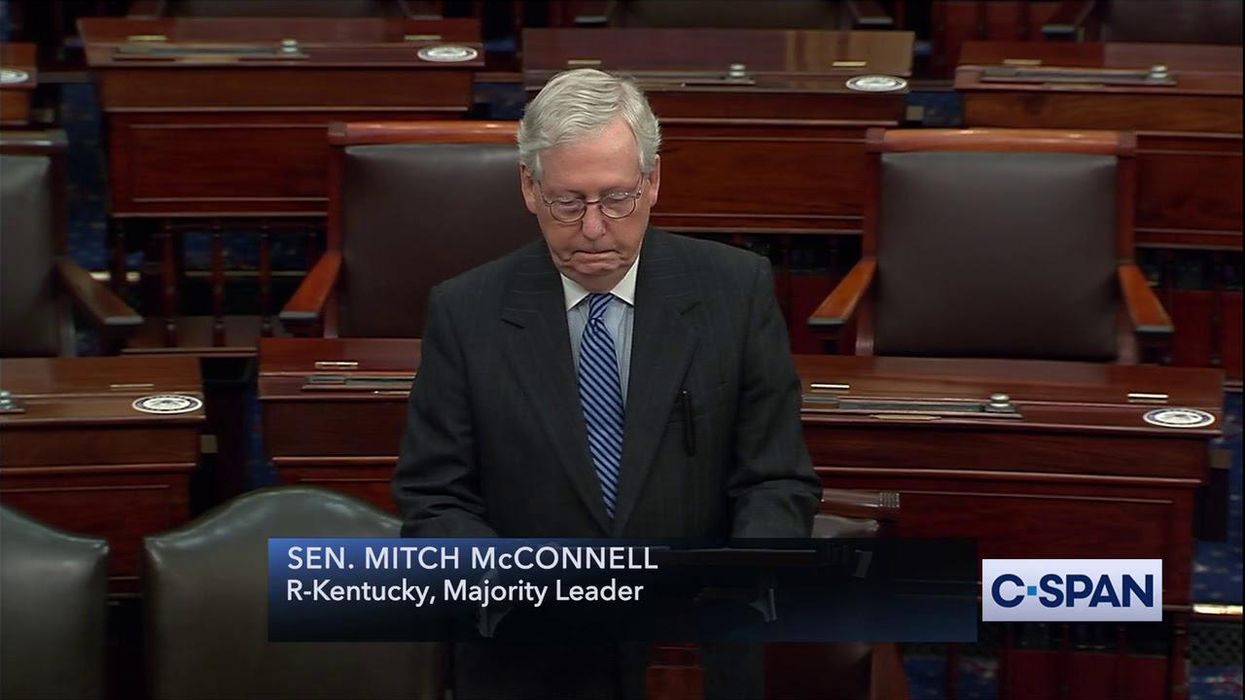The wall of Republican appeasement and enabling cracked big-time on Tuesday, when Senate Majority Leader Mitch McConnell declared he was through with supporting President Trump's crusade to subvert American democracy by discrediting the election he lost.
It took 38 days after the outcome became clear for McConnell, who will be the most powerful Republican in the nation next year, to publicly accept the will of the people with the words, "Today I want to congratulate President-elect Joe Biden."
The senator said his unprecedentedly long wait — which has fueled the baseless but impassioned view of tens of millions of fellow Republicans that the contest was stolen — was ending because "the Electoral College has spoken" and finalized the result Monday evening.
"As of this morning, our country has officially a president-elect and a vice president-elect. Many millions of us had hoped the presidential election would yield a different result, but our system of government has processes to determine who will be sworn in on Jan. 20," McConnell said as the Senate convened.
McConnell had congratulated Trump a day after the 2016 election, but he had repeatedly refused when pressed to publicly acknowledge Biden's win this time.
Only hours before, the defeated incumbent continued to deny the outcome and urge leaders of his party to stick with him. "Many Trump votes were routed to Biden," the president baselessly claimed on Twitter. "This Fake Election can no longer stand. Get moving Republicans."
And less than half an hour after the Kentucky Republican spoke, Trump tweeted: "Tremendous evidence pouring in on voter fraud. There has never been anything like this in our Country!"
McConnell's declaration may open a floodgate of public Republican acceptance of Biden's win, until now dammed up behind the extraordinary way Trump has held GOP officials in Washington and around the country in his thrall. For more than a month, only a dozen or so congressional Republicans have been willing to call Biden the next president.
No matter how baldly Trump has lied about the integrity of the election and other basic democratic norms, thereby fomenting intensifying spurts of violence from his supporters, a lopsided majority of rank-and-file Republicans have declined to call him out — unwilling to cross their base supporters or risk presidential retribution by tweet.
McConnell offered a tribute to Trump's presidency, using the past tense, before congratulating Biden — noting "he is no stranger to the Senate," where he represented Delaware for 36 years, and "has devoted himself to public service for many years." He also congratulated his Senate colleague Kamala Harris of California, saying, "Beyond our differences, all Americans can take pride that our nation has a female vice president-elect for the very first time."
Senate Minority Leader Chuck Schumer — who had berated Republicans on Monday for creating a "national embarrassment" with their delayed acceptance of Biden's win — said that now that McConnell has spoken, "enough is enough."
With McConnell's move, the most influential Republican who has yet to acknowledge the reality of Biden's win is House Minority Leader Kevin McCarthy of California.
The other top members of the Senate GOP leadership — John Cornyn of Texas, Roy Blunt of Missouri and John Thune of South Dakota — only came around to conceding that Biden had won on Monday, and all of them used somewhat convoluted rhetoric.
"In the end at some point you have to face the music," Thune said.
"Once the Electoral College settles the issue," he added, "it's time for everybody to move on."
The turnaround comes beyond the midpoint between Election Day and Inauguration Day, which is five weeks from Wednesday.
And three weeks from Wednesday the final formal act of the election will play out: the tabulating by a joint session of Congress of the 306 electoral votes for Biden and the 232 votes for Trump — with Vice President Mike Pence called on to preside.
A handful of House Republicans have vowed to challenge the votes from some battleground states Biden won, but have not yet divulged what rationale or evidence of alleged malfeasance they will offer. Their complaints will go nowhere unless one senator agrees to join them, but in the end the Democratic-majority House will have the power to squash to the shenanigans.
But the damage to the nation's faith in the electoral system will have been locked in, many historians and election officials have warned, pointing to the significant share of voters — and lopsided majorities of Republicans — who have said in poll after post-election poll that they buy Trump's unfounded claims of vote fraud.
His legal team continues to press an array of legal challenges, some in states he lost badly, hoping to throw out millions of ballots returned by mail or deposited in drop boxes. Attorney General William Barr, who abruptly resigned Monday, has said there is no evidence of cheating big enough to alter results. The same message has been delivered by both Republican and Democratic state election officials from coast to coast. And the Supreme Court has declined to even take up both of the two Trump-backed challenges that have landed on its doorstep.




















Trump & Hegseth gave Mark Kelly a huge 2028 gift